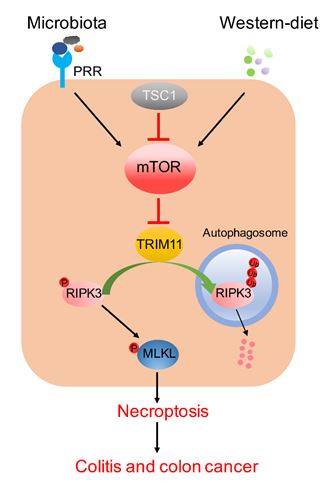Gut epithelial TSC1/mTOR controls RIPK3-dependent necroptosis in intestinal inflammation and cancer

Graphical abstract of the TSC1/mTOR pathway and its' impact on the necroptosis of intestinal inflammation and cancer
While the Western-diet and dysbiosis are the most prominent environmental factors associated with inflammatory bowel diseases (IBDs), the corresponding host factors and cellular mechanisms remain poorly defined. This study entitled “Gut epithelial TSC1/mTOR controls RIPK3-dependent necroptosis in intestinal inflammation and cancer” was conducted by Hui Xiao's lab at Institut Pasteur of Shanghai, in collaboration with Prof. Huabin Li's lab at Fudan University Medical School.
This study demonstrates that the epithelial TSC1/mTOR pathway is instrumental in the regulation of intestinal homeostasis, inflammation, and tumorigenesis. Mechanistically, the metabolic sensor mTOR functions as a hub integrating dietary and microbial signals in the gut, thereby control the expression and activation of RIPK3 through TRIM11-mediated ubiquitination and autophagy-dependent degradation. Moreover, gut epithelial necroptosis and inflammation are intertwined and profoundly shaped by the Western-diet and microbiota in the gut. Overall, the findings of this study support the emerging notion that epithelial necroptosis is a risk factor for intestinal inflammation and cancer and provide new insight into the host response to dietary/microbial cues in the gut.